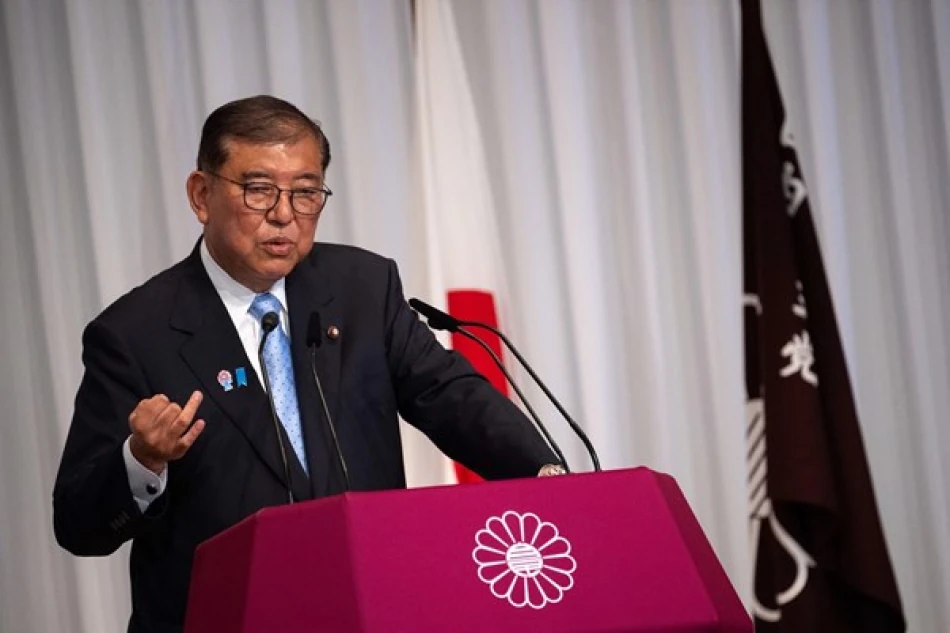
Japan's PM Vows to Stay After Election Defeat, Defying Expectations
Japan's PM Ishiba Clings to Power Despite Electoral Defeat, Eyes Critical Trump Tariff Talks
Japanese Prime Minister Shigeru Ishiba has vowed to remain in office following a crushing defeat for his ruling coalition in House of Councillors elections, positioning himself as the steady hand needed for upcoming tariff negotiations with Donald Trump's administration and Japan's mounting inflation crisis. The decision sets up a precarious political period that could reshape Japan's economic policy at a critical juncture.
Political Survival Meets Economic Reality
Speaking at a press conference Monday, Ishiba made clear his intentions to weather the electoral storm. "I will remain in my position and do everything in my power to chart a course toward solving these challenges," he declared, emphasizing his plan to engage directly with President Trump as soon as possible to achieve "concrete results."
The prime minister's defiance comes as Japan faces a perfect storm of economic pressures. Rising inflation has squeezed household budgets, while the specter of Trump's protectionist trade policies threatens to disrupt Japan's export-dependent economy. Ishiba's calculation appears straightforward: political stability, even if tenuous, trumps the uncertainty of a leadership vacuum during sensitive international negotiations.
The Trump Factor Reshapes Japanese Politics
Ishiba's emphasis on direct engagement with Trump reflects Japan's acute awareness of its vulnerability to U.S. trade policy shifts. During Trump's first presidency, Japan navigated tariff threats through a combination of diplomatic engagement and strategic concessions, including increased purchases of American agricultural products and military equipment.
This time, the stakes may be even higher. Trump's return coincides with Japan's efforts to strengthen its defense capabilities amid regional tensions with China and North Korea. The interplay between trade negotiations and security partnerships will likely define the bilateral relationship, making continuity in Japanese leadership potentially valuable despite domestic political weakness.
Market Implications and Investor Concerns
The political uncertainty creates a challenging environment for investors and policymakers. Oxford Economics' chief Japan economist Norihiro Yamaguchi captured the prevailing sentiment: "The political situation has become volatile and could lead to a change of leadership or coalition reshuffling in the coming months, but Prime Minister Ishiba is likely to remain to complete tariff negotiations with the United States for now."
This assessment suggests markets may face an extended period of political instability, potentially weighing on the yen and complicating the Bank of Japan's monetary policy decisions. A weakened prime minister may struggle to implement decisive fiscal measures to address inflation, while the uncertainty could deter foreign investment at a time when Japan seeks to diversify its economy.
Lessons from Regional Precedents
Japan's situation mirrors challenges faced by other Asian democracies managing economic transitions amid political upheaval. South Korea's experience during the 2016-2017 political crisis demonstrated how prolonged uncertainty can hamper policy effectiveness, even when underlying economic fundamentals remain sound.
However, Japan's institutional stability and the ruling Liberal Democratic Party's deep bench of experienced politicians may provide more continuity than seen in other contexts. The question remains whether Ishiba can leverage this institutional strength to maintain credibility in international negotiations while managing domestic political pressures.
The Path Forward
Ishiba's survival strategy hinges on demonstrating tangible progress on the economic challenges that contributed to his coalition's electoral defeat. Success in tariff negotiations with the U.S. could provide political cover, while failure might accelerate calls for his replacement.
The coming months will test whether Japan's political system can deliver effective governance despite electoral setbacks. For global investors and trading partners, the key question is not just whether Ishiba survives, but whether his weakened position enhances or undermines Japan's ability to navigate an increasingly complex international economic environment.
Most Viewed News

 Layla Al Mansoori
Layla Al Mansoori






